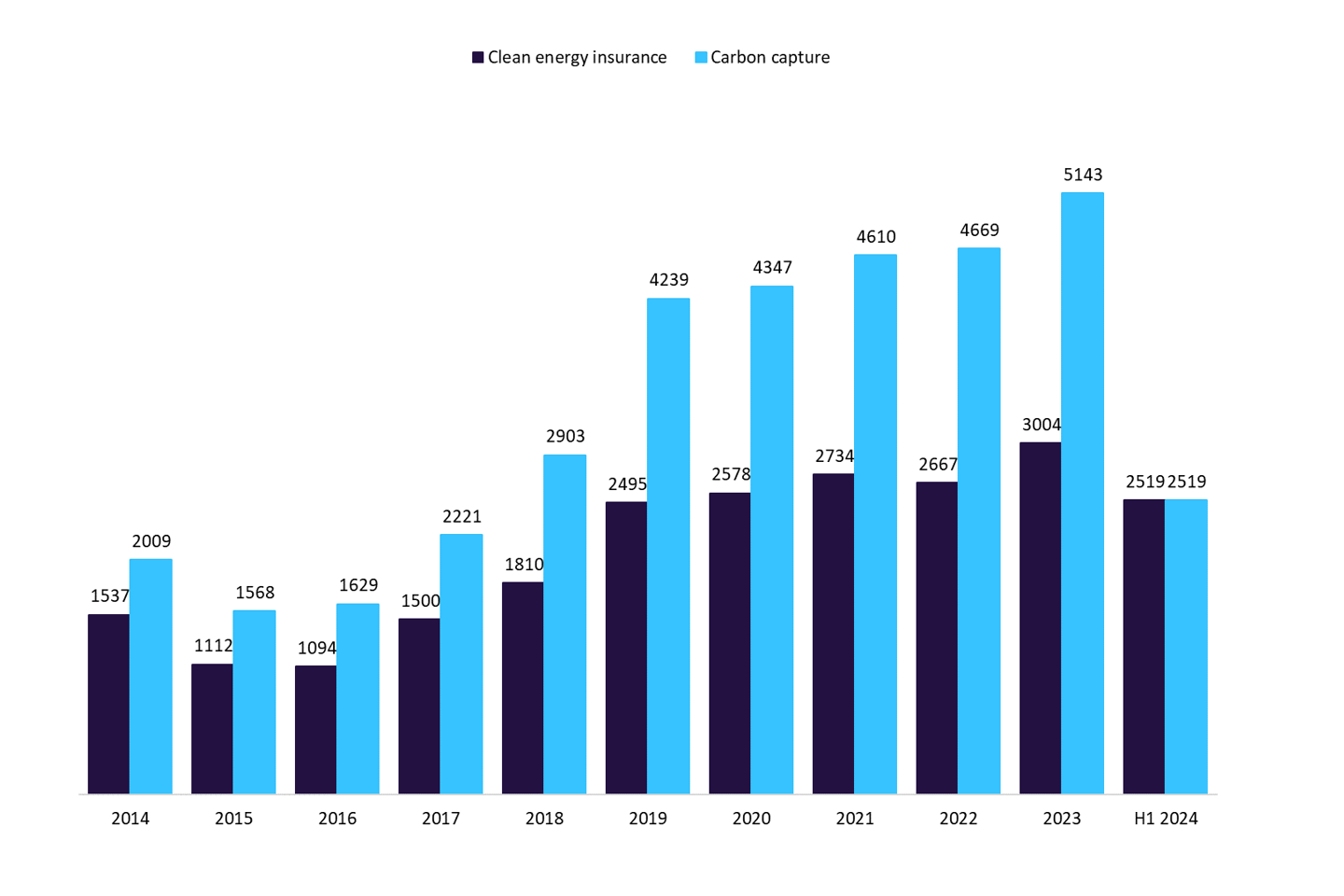GlobalData’s analysis of patent publications highlights a notable increase in patents for clean energy insurance and carbon capture within the insurance industry in recent years, signalling a sector that is consistently striving to facilitate the transition to net zero. With the H1 2024 patent data showing promising results thus far in the year, it is foreseeable that there will be further expansion within this segment.
GlobalData’s Patent Analytics database reveals a notable uptick in patents related to clean energy insurance and carbon capture in recent years. Specifically, the number of patents for clean energy insurance has surged to 3,004 in 2023, a significant increase from 1,537 in 2014. Similarly, patents for carbon capture within the insurance sector have risen from 2,009 in 2014 to 5,143 in 2023. This trend indicates a strategic shift towards developing and targeting these specialized products. Furthermore, H1 2024 patent data suggests that these two segments will continue to see increased innovation. As countries strive to achieve their net-zero commitments through the adoption of such technologies, insurers will have a new stream of income at a time when they continue limiting cover for carbon-intensive industries. Consequently, numerous companies have been launching new products and services to cater to this evolving landscape.
The prime example of the industry’s move is the collaboration between Zurich Insurance Group and Aon to establish a clean energy insurance facility for hydrogen projects, which signifies a crucial advancement in supporting the shift towards sustainable energy sources. The high demand for insurance solutions in the clean energy sector, as evidenced by the oversubscription of the facility, underscores the growing interest in this area. The involvement of players such as Zurich and Aon highlights the significance of risk management and financial protection in facilitating the progress of clean energy projects. By providing comprehensive coverage for blue and green hydrogen projects, as well as Carbon Capture Utilization and Storage (CCUS) technologies, the facility addresses the complex risks associated with these initiatives, offering developers and investors the confidence needed to pursue such ventures.
Clean hydrogen is increasingly being acknowledged as a feasible alternative to traditional fossil fuels. The availability of tailored insurance solutions is anticipated to stimulate additional investment and foster innovation in this sector. Furthermore, the incorporation of coverage for CCUS technologies in insurance offerings reflects a holistic approach to risk management across the entire value chain of hydrogen production. This all-encompassing coverage not only safeguards against potential operational disruptions but also strengthens the resilience of clean energy infrastructure.
The insurance industry’s dedication to embracing cleaner technologies is increasingly apparent as insurers are implementing measures to curtail or limit coverage for carbon-intensive sectors such as coal mining. Insurers are establishing timelines and objectives to realize a more sustainable operational framework, with many striving for a transition to net-zero emissions. For instance, Munich Re has committed to reducing emissions linked to thermal coal underwriting by 35% by 2025 from a 2019 baseline, with a complete phase-out planned by 2040. Additionally, the company aims to decrease emissions associated with oil and gas underwriting by 5% by 2025 from a 2019 baseline and achieve net-zero emissions by 2050. Furthermore, Howden introduced an insurance facility that addresses the seepage of carbon dioxide from large-scale carbon capture and storage facilities, driving crucial investment to bolster the global transition to net-zero emissions.
The approaches taken by Zurich, Aon, Howden, and Munich Re mark a significant step forward in the insurance industry’s support for clean energy investments. Through comprehensive insurance solutions for hydrogen projects and supporting clients, these collaborations will play a crucial role in accelerating the energy transition and meeting net-zero targets. While the clean energy sector offers promising growth prospects and environmental benefits, it also comes with inherent risks. This highlights the importance of emerging clean energy insurance solutions. Insurers have a critical role to play in facilitating the transition to a low-carbon future and mitigating the risks of climate change. By supporting clients in navigating the evolving landscape of clean energy investments, insurers can contribute significantly to accelerating the energy transition and achieving net-zero targets.

US Tariffs are shifting - will you react or anticipate?
Don’t let policy changes catch you off guard. Stay proactive with real-time data and expert analysis.
By GlobalData








